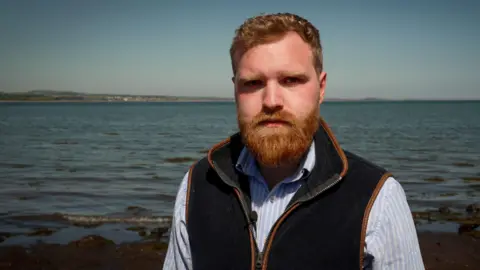BBC Scotland News
 BBC
BBCSocial experiments on Scotland’s Gypsy travellers – including children being forcibly taken into care – were a form of “cultural genocide”, new research claims.
State-sanctioned schemes operated across Scotland in the last century which aimed to “settle” travellers by forcing them to leave their lives on the road for permanent settlements.
A draft report of independent research commissioned by the Scottish government suggests there was also a “forced and systematic initiative” to remove traveller children from their families and communities.
The Scottish government said it recognised that Gypsy traveller communities had been adversely affected through historical policies and would set out its response to the research soon.
Efforts to “assimilate” travellers into Scottish society were first documented in the late 1800s, with the authorities wanting to force Gypsies into “normal” housing.
One operation, known as the “Tinker Experiment”, ran from the 1940s to 1980s and was supported by UK governments and Scottish local authorities at the time.
In 2023 the Scottish government asked independent academics to research this experiment in the available archives.
A draft of their findings was completed in September last year, and has been seen by BBC Scotland.
It said that in addition to the well-documented housing issues, there was a “forced and systematic initiative to remove Gypsy/traveller children from their families and communities”.
This saw traveller children being placed into care, forced to attend industrial schools or adopted by non-traveller families in Scotland and overseas.
The report, produced by academics working for the Third Generation Project at the University of St Andrews, said churches, charities, local authorities, the police and the UK government’s Scottish Office all played a role in this.
The academics recommend the Scottish government, as the body now responsible for the issue, issues an apology and consider paying compensation to those affected.
‘Truths buried for decades’
The draft report says that the apology should be for the polices, such as the Tinker Experiments, which “led to the dehumanisation, control, and assimilation” of travellers – as well as “the lack of action to redress these actions that are best characterised as ‘cultural genocide’.”
Members of Scotland’s traveller community have been campaigning for an apology for their treatment for years.
The report’s findings are explored in a new BBC podcast called ‘The Cruelty – Stolen Generations’.
Presenter Davie Donaldson, who comes from the traveller community, said: “I have spoken to many Scottish travellers whose families have been shattered and split apart because of the forced removal, generation after generation, of their children.
“This investigation has unearthed truths buried for decades, but now, with the leaked report, we have irrefutable evidence of what survivors and communities have long known – the state was complicit in the removal and segregation of traveller children.
“For the first time, it is named for what it was – cultural genocide.”
‘Trying to kill a culture’
Martha, who asked for her surname not to be published, said she was forcibly removed from a Scottish traveller camp when she was just six months old.
Her parents were out working while her grandparents were looking after her and her five siblings and cousins.
Martha, who is now in her sixties, said all the children present were removed and she was eventually adopted by a non-traveller family.
“Genocide means killing something and that’s what they were attempting to do by looks of things,” she says.
“They were trying to kill a culture by taking the kids away, thinking that they would grow up with settled people and be like settled people.
“I think they should apologise. Because I stand firm in the fact that if it hadn’t been for them, I would’ve known my parents, I would’ve known my three sisters and my two brothers that we were never told about.”
Fellow traveller Elizabeth, who also asked for her surname not to be published, said four of her siblings were forcibly removed when she was a child.
The 52-year-old said she and two other siblings were only able to stay with their parents because they all hid away in the Fife countryside, away from their traveller community.
She said: “We were happy when we were in the camp. We didn’t have much, but we were happy.
“It’s kind of destroyed a lot of people’s lives, this separating families and taking bairns away from the folk and it should never have happened.
“They should be made responsible, including the churches and anybody else that was involved in it, because it’s affected every one of us. I hope this government we have actually takes action.”
Understanding events
Gypsy travellers were settled on sites across Scotland, including in Aberdeenshire, Argyll, Highlands, Perthshire, Fife and the Borders.
Researchers said it was hard to pinpoint how many were forced from this life, or how many children were forcibly removed from the community.
The Scottish government said it had been working with local authorities’ body Cosla on a £3m action plan aimed at supporting improvements to accommodation, education, healthcare and access to benefits for the traveller community.
A Scottish Government spokesperson said: “We recognise that Gypsy/traveller communities have been adversely affected through historical policies and actions and we want to understand events as fully as possible.
“We are committed to ensuring the voices of Gypsy/traveller communities are reflected in key decision-making forums and continue to take forward measures in our joint action plan with Cosla to improve outcomes for Gypsy travellers.”
The spokesperson said the independent archival research had been undertaken to establish key events, decisions and roles and will be officially published in due course, after which the government will consider its next steps.

